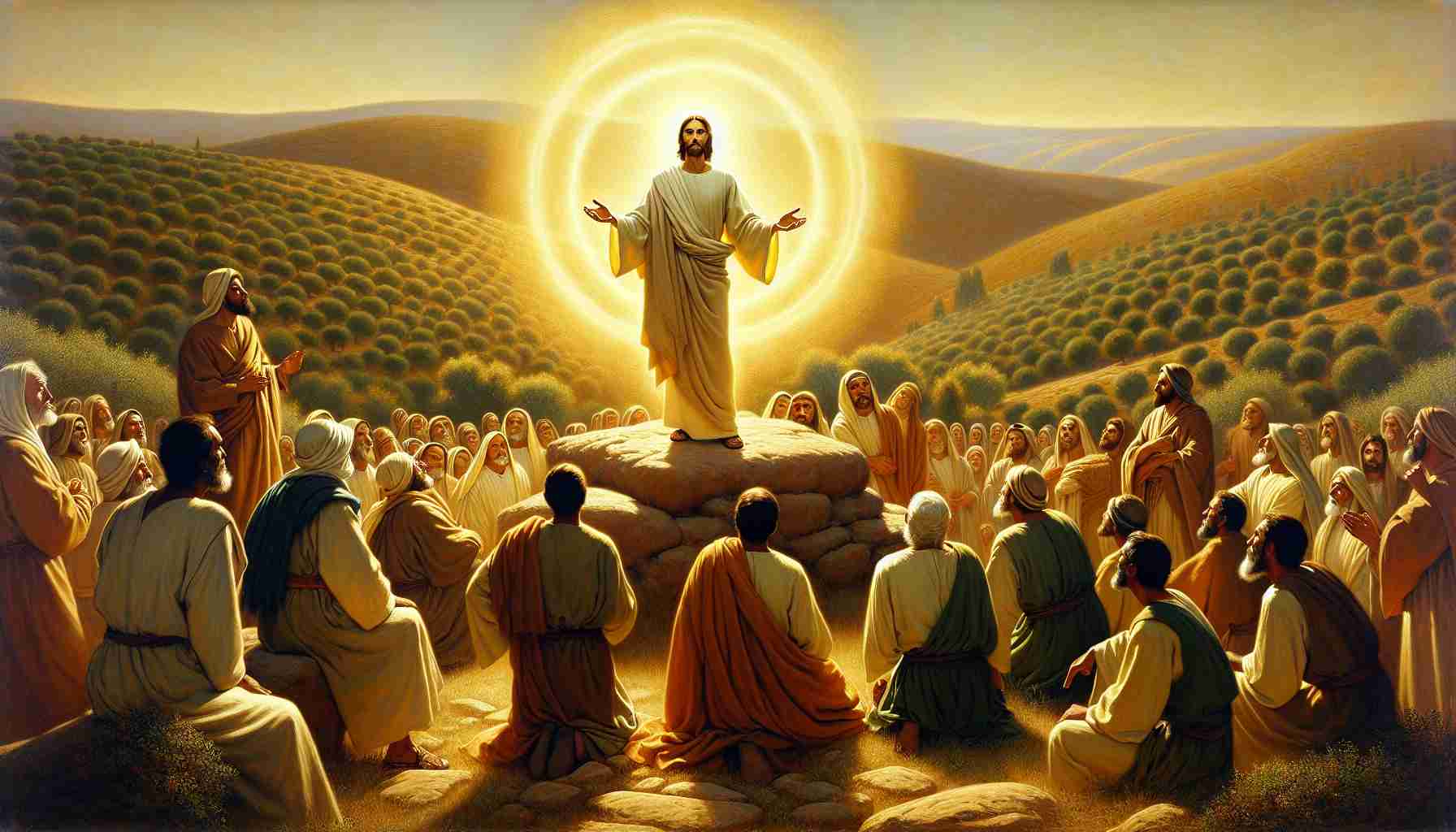

The crowd pressed in around me like a rising tide—merchants, fishermen, mothers with swaddled babes, even a few Roman soldiers watching from a distance. I stood on the edge of the slope, just beyond the cluster of olive trees, trying to decide if I belonged here. The sea shimmered in the distance, and above it, on the hill, that man—Jesus—was speaking. They said He healed lepers. They said He forgave sins. But what could He say to a man like me?
I pulled the hood of my robe tighter, trying to disappear among the crowd. Nobody knew me here, not like in my village, where they stared at me as though guilt had settled on my shoulders like sackcloth. My wife—now gone. My brother—cut off from me. The dispute over land had divided my family. It wasn’t just the loss of property. I had cursed him in anger, vowed never to forgive. And he had done the same. Bitter words, sharp as daggers, thrown in the heat of wrath. That was two years ago, and every day since had tasted like ash.
Now this Jesus spoke of the Kingdom of Heaven—not for the mighty, but for the poor in spirit. I leaned in.
"You have heard it said," He called out, His voice clear, steady, "‘You shall not murder…’ But I say to you, anyone who is angry with a brother is liable to judgment."
My stomach dropped.
“If you are offering your gift at the altar,” He continued, "and there remember your brother has something against you—leave your gift. First, be reconciled to your brother."
The words struck something raw. Not just guilt. Hope—worn and buried, but still alive beneath the rubble.
I hadn’t offered a sacrifice in over a year. What gift did I have that God would accept? I glanced down at my calloused hands. Empty.
Jesus looked out over the crowd, and for the briefest moment, I thought His eyes landed on mine. I froze—not from fear, but from the sudden ache His gaze seemed to understand.
He began to speak of lilies in the field, how they do not toil or spin, and still, the Father clothes them. He spoke of a narrow road, of turning the other cheek, of loving enemies. My heart shouted: But what of justice? What of all I’ve lost?
And then He spoke: "Forgive—and you will be forgiven."
For the first time in years, something unclenched within me. Not everything was lost. I didn’t know if my brother would ever speak to me again, but I could choose to let go. To try again. This—this was the narrow road.
As the crowd began to scatter, I did not linger. I walked down the hill, the sun warm on my shoulders, and in my chest, the weight began to lift. One foot in front of the other, I turned towards home—not to reclaim what was mine, but to restore what I had broken.
The crowd pressed in around me like a rising tide—merchants, fishermen, mothers with swaddled babes, even a few Roman soldiers watching from a distance. I stood on the edge of the slope, just beyond the cluster of olive trees, trying to decide if I belonged here. The sea shimmered in the distance, and above it, on the hill, that man—Jesus—was speaking. They said He healed lepers. They said He forgave sins. But what could He say to a man like me?
I pulled the hood of my robe tighter, trying to disappear among the crowd. Nobody knew me here, not like in my village, where they stared at me as though guilt had settled on my shoulders like sackcloth. My wife—now gone. My brother—cut off from me. The dispute over land had divided my family. It wasn’t just the loss of property. I had cursed him in anger, vowed never to forgive. And he had done the same. Bitter words, sharp as daggers, thrown in the heat of wrath. That was two years ago, and every day since had tasted like ash.
Now this Jesus spoke of the Kingdom of Heaven—not for the mighty, but for the poor in spirit. I leaned in.
"You have heard it said," He called out, His voice clear, steady, "‘You shall not murder…’ But I say to you, anyone who is angry with a brother is liable to judgment."
My stomach dropped.
“If you are offering your gift at the altar,” He continued, "and there remember your brother has something against you—leave your gift. First, be reconciled to your brother."
The words struck something raw. Not just guilt. Hope—worn and buried, but still alive beneath the rubble.
I hadn’t offered a sacrifice in over a year. What gift did I have that God would accept? I glanced down at my calloused hands. Empty.
Jesus looked out over the crowd, and for the briefest moment, I thought His eyes landed on mine. I froze—not from fear, but from the sudden ache His gaze seemed to understand.
He began to speak of lilies in the field, how they do not toil or spin, and still, the Father clothes them. He spoke of a narrow road, of turning the other cheek, of loving enemies. My heart shouted: But what of justice? What of all I’ve lost?
And then He spoke: "Forgive—and you will be forgiven."
For the first time in years, something unclenched within me. Not everything was lost. I didn’t know if my brother would ever speak to me again, but I could choose to let go. To try again. This—this was the narrow road.
As the crowd began to scatter, I did not linger. I walked down the hill, the sun warm on my shoulders, and in my chest, the weight began to lift. One foot in front of the other, I turned towards home—not to reclaim what was mine, but to restore what I had broken.